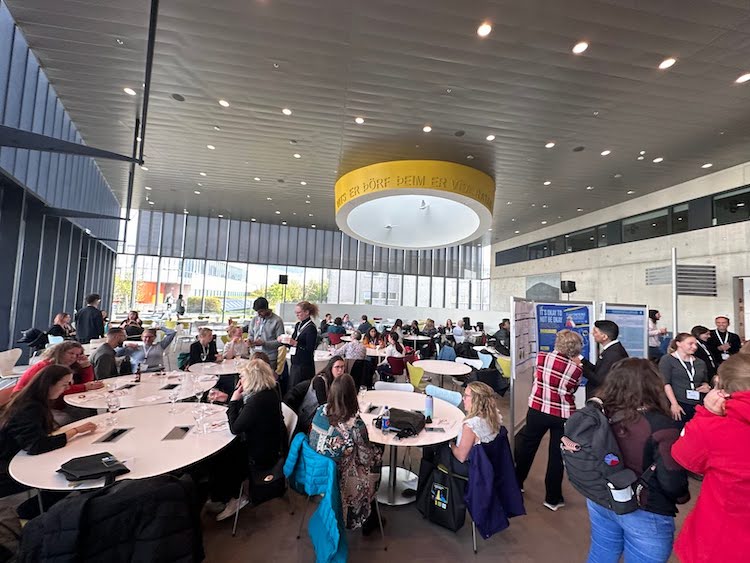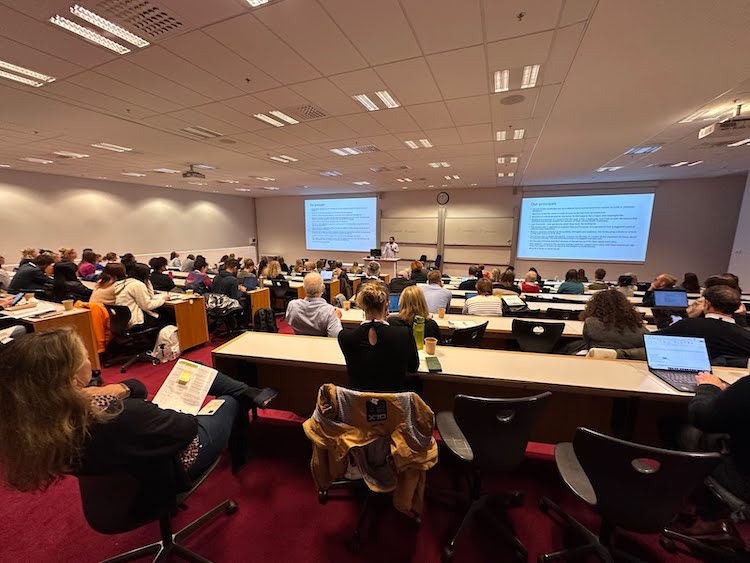Irsay Institute hosts a Together Against Stigma meeting in Iceland
July 15, 2024
In June, 14 Irsay faculty, students, and staff traveled to Reykjavík, the capital of Iceland, where the Irsay Institute co-hosted the World Psychiatric Association Together Against Stigma 2024 Co-Sponsored Meeting.

Conference attendees during the poster session before the start of the welcome reception.
Set in the heart of the University of Iceland’s stunning campus in Reykjavík, the conference targeted researchers, advocacy groups, people with lived experience, and policymakers. The goals included sharing novel insights — scientific, policy, programmatic, and experiential — on the current status of stigma, especially the complex layers and multiple identities of stigma, and describing or proposing advances in stigma reduction.
Over the course of three days, June 2–5, 155 participants from 28 countries took part in four plenaries and a wide spread of parallel sessions that featured a total of 111 contributed talks and posters. Forty-five more participants joined for virtual sessions and livecasted plenaries. Contributions marked where the stigma field is locally, nationally and internationally; provided data and lived experience reports on the intersection and layering of stigma across identities; and described, evaluated, and proposed new directions to end stigma.
IU Research supported student participation in the event. Elizabeth Anderson, a sociology graduate student, presented her work on cross-national variation in the association between stigma, measured by social distance and treatment-based stigma, and respondents' open-ended suggestions for care. This work used data from the Stigma in a Global Context-Mental Health Survey (SGC-MHS). Anderson said seeing the variety and scope of stigma interventions from around the world and the different approaches by researchers was eye-opening.
“I thought it was interesting to see intervention research in a way that I hadn't really before,” Anderson said. “It was just interesting to see the different interventions that people were coming up with and thinking through the sociology of what might make sense as a more effective intervention and what might not.”

Conference attendees at one of the four keynote sessions.
Plenary speakers included Irsay Director Bernice Pescosolido, IU alum and Professor of Social Science at the University of Iceland, Sigrún Ólafsdóttir, and experts in the field including Nicolas Rüsch and Sir Graham Thornicroft.
Irsay Assistant Research Scientist Megan Bolton gave a talk, as did Irsay Graduate Fellows Elizabeth Anderson, Emily Ekl, Guangquan Shen, and Brandy Smith, a sociology graduate student and Jane Jorgensen DEI Intern at the Irsay Institute. Irsay Co-Director Brea Perry and Assistant Research Scientist Heather Francis were contributing authors.
The conference was sponsored by the Irsay Institute, the World Psychiatric Association, IU Research, Bring Change to Mind, and the University of Iceland.